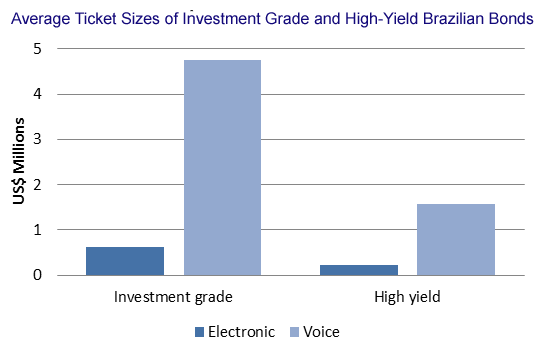Fixed Income Trading in Brazil: Long Road to E-Trading
Abstract
Electronic trading in Brazil is still nascent. The biggest challenge is to achieve a level of liquidity and competition in the secondary fixed income markets that makes electronic trading more efficient and economical.
In the report Fixed Income Trading in Brazil: Long Road to E-Trading, Celent analyzes the development of the market, with a focus on the evolution of electronic trading.
The Brazilian corporate bond market is one-sided; bond holders hold their positions to maturity, which means that there is limited liquidity and trading in the secondary markets. However, the government bond market is more mature. The average daily trading volume in government bonds is around 15 times that of corporate bonds. Celent estimates that electronic trading accounted for 5.7% of the total secondary market trading volumes in government bonds, and 2.4% of the total trading volumes in corporate bonds in 2012. Trading in Brazilian fixed income is also highly concentrated, with the top six players accounting for more than half of the total fixed income trading. Domestic banks are dominant, with a large retail customer base.
The interest rate derivatives market in Brazil is highly liquid. The average daily turnover of interest rate futures was around US$65 billion, compared to around $5.3 billion in government bonds and around $400 million in corporate bonds in 2012. It is interesting that among emerging market economies, Brazil’s derivatives market is mostly listed, with exchange-traded derivatives making up around 95% of derivatives trading activity.

“The Brazilian fixed income market has significant ground to make up before trading firms are able to realize the advantages of investing in electronic trading technologies,” says Muralidhar Dasar, Analyst with Celent’s Securities and Investments Group and author of the report. “Increased competition in secondary bond markets should provide the required impetus for faster adoption of electronic trading in bond markets.”
“A liquid secondary market will expand the capacity to raise debt and make meaningful hedging possible,” says Axel Pierron, Senior Vice President with Celent’s Securities and Investments Group and coauthor of the report. “As the secondary market expands and deepens, it could create a suitable environment where transacting electronically would be more meaningful.”
The report begins with an overview of the Brazilian fixed income market and analyzes the trading behavior in fixed income instruments. The report then examines electronic trading, in view of the global regulatory changes and greater technology facilitation in developed markets, and evaluates the potential for growth of electronic trading in Brazil.

